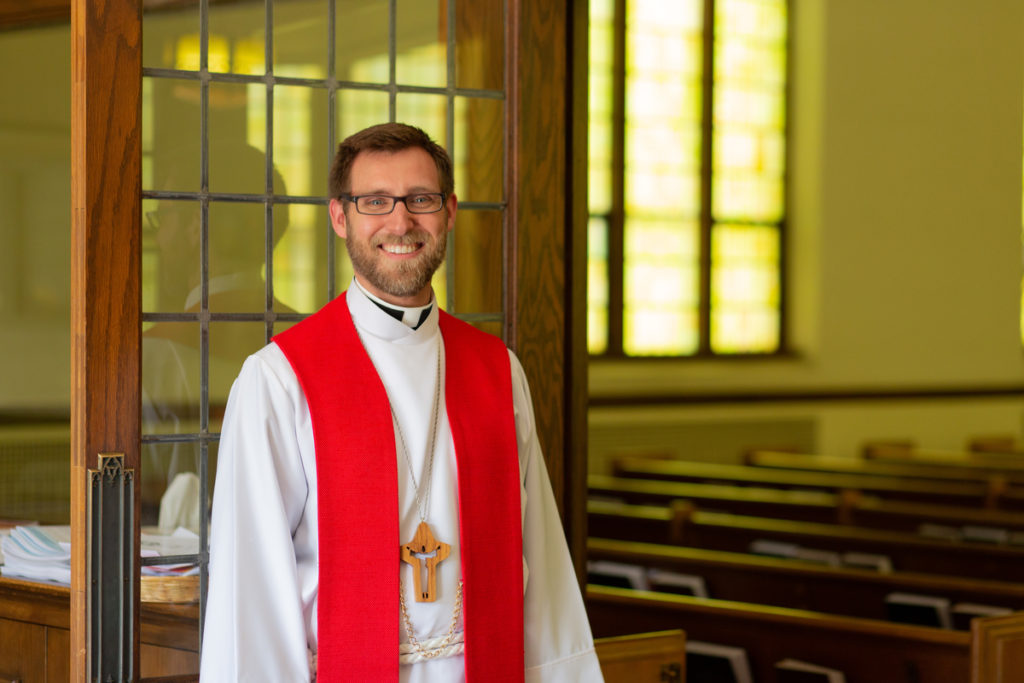Ashman, Scott. Who Am I? Exploring Your Identity Through Your Vocations
Who am I? What is my purpose in life? How should I live? This book invites you to explore your identity through your callings, to imagine living virtuously for others, and to discover deep meaning and satisfaction in life. You’ll look at many vocations that young people have or will have later in life.
Bainton, Roland. Here I Stand: A Life of Martin Luther
The Reformation of the sixteenth century was a vast and complicated movement. It involved kings and peasants, cardinals and country priests, monks and merchants. It spread from one end of Europe to the other and manifested itself in widely differing forms. Yet in spite of its diverse and complex character, to start to understand the Reformation you need know only one name: Martin Luther. Roland Bainton’s Here I Stand: A Life of Martin Luther remains the definitive introduction to the great Reformer and is essential reading for anyone seeking to understand this towering historical figure.
Bird, Chad. Unveiling Mercy: 365 Daily Devotions Based on Insights from Old Testament Hebrew
Unveiling Mercy will do just that—unveil how the mercy of God in the Messiah is spoken of from the very opening Hebrew word of the Bible, all the way to the closing chapter of Malachi. By the end of the year, you will have entered the Old Testament through 365 new doorways, looked with fresh eyes at old verses, and traced a web of connections all over the Scriptures that you never spotted before.
Bonhoeffer, Dietrich. The Cost of Discipleship
Speaking as a man who truly lived out his faith under the worst of circumstances, Dietrich Bonhoeffer does so with a mantle of authority. The bulk of this book is devoted to reclaiming the rightful place of the Sermon on the Mount, and by extension, the teaching of the Gospels, in the life of the believer. German Lutheran pastor and theologian, Bonhoeffer was an example of sacrificial faith. He opposed the Nazis from the first and was eventually imprisoned in Buchenwald and hung by the Gestapo in 1945.
Cullinan, Alice R. Sorting It Out: Discerning God’s Call to Ministry
Sorting It Out walks Christians of all ages through the questions and uncertainties that come with a person’s call to vocational ministry. Alice R. Cullinan analyzes what a call is, provides many examples of how others have received the call, considers the different kinds of ministry opportunities, and offers advice on how to proceed once one discerns a calling from God.
Forde, Gerhard O. Free to Be: A Handbook to Luther’s Small Catechism
This revised version uses updated activities and examples to explore Luther’s Small Catechism and relate powerful Reformation truths to today’s world. Thirty sessions. Available as both student book and teacher guide.
Guiness, Os. The Call: Finding and Fulfilling God’s Purpose for Your Life
Os Guinness has penned a classic reflective work on life’s purpose. Far bigger than our jobs and accomplishments and higher than our wildest ideas of self-fulfillment, our calling does more than give purpose and meaning to our lives. It completes God’s plan for us.
Hoppes, Peggy. A Thirty-Day Walk Through Luther’s Catechism
This 30-day devotional book follows the sections of Martin Luther’s Small Catechism and is designed for daily reflection on the Scriptures and the faith that we share. Guiding the reader through a journey of Law to Gospel, the devotions are meant to show readers their need for grace and where that grace is found in Jesus Christ. The book is not only meant as a basic daily devotional and prayer resource; it also serves as a brief overview of the themes of the Small Catechism.
Johnson, Donald W. Praying the Catechism
This devotional book invites you to experience the parts of the catechism through a journey of prayer and meditation. Originally written for adults preparing for baptism, it is divided into two sections, which may be used approximately forty days before and fifty days after baptism. If baptism occurs at the Easter Vigil, the two sections are especially appropriate for the seasons of Lent and Easter, respectively. It is hoped that people preparing to affirm their faith, whether old or young, will find this book helpful. It is also hoped that this book will be used by individuals and families as a part of their devotional life. In this case, the book may be used in its ninety-day entirety, or the devotions may be undertaken in smaller sections through the six sections of the Catechism: the Ten Commandments, the Creed, the Lord’s Prayer, Baptism, Eucharist and Confession.
Jones, Ken Sundet. A Lutheran Toolkit
Ken Sundet Jones sees the primary themes of the Augsburg Confession as a set of tools that God uses to build faith in us. He takes the reader beyond scholarly analysis and historical explanations and uses his own experience as a college professor, parish pastor, and sinner looking for mercy, to discover God’s handiwork in our lives. The tools in this tool kit continually point to Jesus as the one who promises mercy and abundant life — and who has the power to deliver them. This is a word for those who have not yet heard it and for those who desperately need to hear it again.
Keller, Timothy. The Prodigal God: Recovering the Heart of the Christian Faith
New York pastor Timothy Keller uses the story of the prodigal son to shine a light on the central, beautiful message of Jesus: the gospel of grace, hope and salvation. Keller argues that the parable of the prodigal son, while Jesus’ best-known parable, is also his least understood. He introduces the reader to all the characters in this timeless story, showing that it concerns not just a wayward son, but also a judgmental older brother and, most importantly, a loving father. This short but powerful book is a reminder to the faithful, an explanation to the seeker, and finally an invitation to all – both older and younger brothers – to enter into the ‘unique, radical nature of the gospel’: the reckless, spendthrift love of God.
Kimball, Dan. How (Not) to Read the Bible: Making Sense of the Anti-Women, Anti-Science, Pro-Violence, Pro-Slavery and Other Crazy Sounding Parts of Scripture
For centuries, the Bible was called “the Good Book,” a moral and religious text that guides us into a relationship with God and shows us the right way to live. Today, however, some people argue that the Bible is outdated and harmful, with many Christians unaware of some of the odd and disturbing things the Bible says. Whether you are a Christian, a doubter, or someone exploring the Bible for the first time, bestselling author Dan Kimball will guide you step-by-step in how to make sense of these difficult and disturbing Bible passages. Filled with stories, visual illustrations, and memes reflecting popular cultural objections, How (Not) to Read the Bible is a lifeline for individuals who are confused or discouraged with questions about the Bible. It also works great as a small-group study or sermon series.
King, Steve and Little, Amy. Getting to Know Martin Luther
By learning from Martin Luther’s life, we get a better glimpse into what faith means for our own life – searching and understanding the Word of God, trusting in Christ alone for our salvation, standing up for what we believe in, and helping others to learn the truth about God.
Luther, Martin. On Christian Liberty
On Christian Liberty communicates essential teachings of Martin Luther. Luther’s great insight into the freedom of the Christian proved revolutionary in his century and remains timely and poignantly relevant in our own. For the Christian, this freedom means liberty from sin and death, as well as the opportunity to serve one’s neighbor.
Marty, Martin E. Lutheran Questions, Lutheran Answers
Lutherans often have questions about Lutheran theology and beliefs that are basic to the Christian faith itself. Featuring a unique question-and-answer format, Lutheran Questions, Lutheran Answers is an accessible and concise treatment that provides the most frequently asked questions on important topics and brief but complete answers from a distinguished Lutheran historian and theologian.
Nouwen, Henri J. M. In the Name of Jesus: Reflections on Christian Leadership
Henri Nouwen was a spiritual thinker with an unusual capacity to write about the life of Jesus and the love of God in ways that have inspired countless people. This is the most widely read of the more than forty books that Father Nouwen wrote. For a society that measures successful leadership in terms of the effectiveness of the individual, Father Nouwen offers a counter definition that is witnessed by a “communal and mutual experience.” For Nouwen, leadership cannot function apart from the community. His wisdom is grounded in the foundation that we are a people “called.” This beautiful guide to Christian leadership is the rich fruit of Henri Nouwen’s own journey as one of the most influential spiritual leaders of the twentieth century.
Rosenbladt, Rod. Christ Alone
In our postmodern, pluralistic world, there are plenty of genuinely spiritual people who consider Christ a way to heaven, or even their way to heaven, but who refuse to acknowledge Him as the only way for everyone. In their estimation, anyone who stresses an exclusive, saving faith in Jesus Christ is at the least intolerant and, at worst, completely ignorant. Yet, as Rod Rosenbladt shows in this booklet, there are numerous evidences that support the centrality and exclusivity of Christ. Even in the face of sophisticated theological attacks, God’s Word – and Christ’s unique claims – still hold true. There is One whose words and works stand far above all others, and whose entire existence proves His exclusive claims. He deserves not only our worship, but our witness before a lost world.
Saint Augustine. Confessions
Written between 397 and 400 AD, this work outlines Saint Augustine’s sinful youth and his conversion to Christianity. It is generally considered one of the most important texts of this early church leader and is widely seen as the first Western autobiography ever written.
Sutton, A. Trevor. Being Lutheran
“Why are you Lutheran?” is a valid question in this modern age of denominations, distinctions, and choices. Being Lutheran is an explanation of Lutheran theology for the modern layperson. Using “normal” language and applications to daily life, it translates complex theology into understandable knowledge, exploring such topics such as vocation, means of grace, law and gospel, and much more.
Sutton, A. Trevor. Why Should I Trust the Bible?
You have tough questions about the Bible. Maybe you have even heard things like, “The Bible is racist,” “The Bible has too many errors and edits,” or “The Bible is merely a mythological story like Homer’s Odyssey.” This book tackles accusations like those head-on. Pastor Sutton compares the Bible to writings that have been deemed more credible than the Bible, like the Book of Mormon, encyclopedias, and even Shakespeare’s works. He tests the Bible using the same rigorous standards that have been used to test those other writings. He examines historical evidence, witness accounts, and translation concerns. By the end, you will be able to better defend your faith when its very foundation is attacked. You will get many of your tough questions answered. And you will see that when all other texts fall, the Bible still stands – completely, undeniably trustworthy.
Tranvik, Mark. Martin Luther and the Called Life
One of the hallmarks of Luther’s theology was his concern for daily life. His concept of vocation is a way of understanding that all of life is under the care and interest of God. All of our activities are a part of a called life. Tranvik begins this book with a clear exposition of Luther’s context and a focus on how the reformer actually lived out his own calling. He rapidly moves into the contemporary sphere, drawing on twenty years of teaching and interaction with undergraduate students to outline how a renewed understanding of vocation is a powerful and liberating tool for life in the twenty-first century.
Veith, Gene Edward, Jr. The Spirituality of the Cross
A challenge for today (for both Christians and non-Christians alike) is to cultivate a meaningful life in a seemingly meaningless world. Our natural religious impulse is to earn salvation based on what we do and what we deserve according to our own moral compasses. Lutheran Christianity is different. The theology of the cross provides an understanding that relates to the world we live in today. Presenting a true understanding of justification by faith, the means of grace, vocation, theology of the cross, the two kingdoms, worship, and the church, this book is an excellent explanation of Lutheran spirituality.
Williams, Rowan. Being Christian: Baptism, Bible, Eucharist, Prayer
In this simple, beautifully written book Rowan Williams explores four essential components of the Christian life: baptism, Bible, Eucharist, and prayer. Despite huge differences in Christian thinking and practice both today and in past centuries, he says that these four basic elements have remained constant and indispensable for the majority of those who call themselves Christians. In accessible, pastoral terms this former Archbishop of Canterbury invites the reader to really think through the Christian faith and how to live it out. Questions for reflection and discussion at the end of each chapter help readers to dig deeper and apply Williams’s insights to their own lives.



















